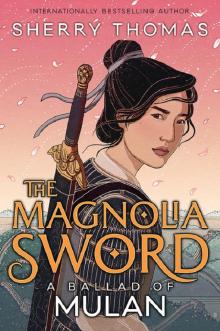- Home
- Sherry Thomas
The Magnolia Sword Page 24
The Magnolia Sword Read online
Page 24
The emperor turns around. I am caught with one sweet fried honey bing in each hand.
He smiles. “Ah, the appetite of the young. Eat as you wish, Hua xiong-di.”
Not with him looking at me. I set the goodies down, even as I bow and say, “Yes, Your Imperial Majesty.”
He shakes his head a little. “Are you married, young brother? Will your wife thrill to the prospect of welcoming home a hero?”
“I’m not married, sire.”
“But a match has been arranged for you?”
“No, not yet, sire.”
The emperor raises a brow. “How old are you, my boy?”
“Nineteen, sire.”
“Nineteen and not betrothed? I was three years married by that age. Should everything go well today, I will see to it that you will have a beautiful and loving wife.”
And wouldn’t she have a surprise coming. I sink to one knee. “Thank you, sire. Your Imperial Majesty’s kindness is that of springtime sun.”
He smiles again. “Eat more.”
And very considerately turns his back to me. I gobble down the honey buns and swill another cup of tea—ah, what nectar!—just in time for him to turn around again.
“Where did Kai-er find a martial artist of your caliber?”
Er is often attached to a character of one’s name by one’s elders, to make a “little name” to use at home and among intimates. Mother always called me Lan-er. As for Father—I can’t remember him ever calling me by my name.
“His Highness knows me because of a family connection. We are to fight a duel against each other.” It’s been a long night and I can’t manage any prettier answers.
The emperor’s eyes widen. “He spoke to me about the duel after he returned from the South. He said that the young man he thought he would be fighting did not live past infancy. And that his opponent would be a girl.”
It becomes my turn to be taken aback. “Oh, he did?”
The emperor scrutinizes me more closely. Then he smiles widely. “I was wondering how he managed to locate a martial artist who is both fiercer and prettier than he is. I have my answer. Shall I seek a beautiful and loving husband for you, then?”
I can’t help smiling a little myself. “Thank you, sire. But I shall need to consult my father first.”
“Of course.” The emperor nods with approval. “Were you a man, I would have offered you an excellent position. But I don’t suppose that is what you seek.”
Do I want an excellent position? I’ve never thought about it. Such choices are not given to women. “I … I seek nothing, sire. There are no able-bodied men in my household, but I am more than able-bodied, so I answered the conscription.”
“Kai-er chose a dangerous course. You needed not have traveled this path with him. From his account, you are barely a Northerner.”
“But the North has sheltered my family and me, and for that I am grateful. And one does not abandon friends in their hour of need. So one might say, sire, that I traveled this path for duty and friendship.”
“That is the answer a man would have given,” says the emperor.
“I beg a thousand pardons, sire, but that is the answer any right-thinking person should give.”
The emperor gazes at me a moment. “Well said.”
He turns his back to me again. My heart thumps and my fingertips shake. I’ve just held a conversation with the emperor. Well, the emperor of only the North, but still.
“And since you are a right-thinking person, my child,” says the emperor, still with his back to me, “what do you think of what Lord Sang said, that every founder of a dynasty is a usurper? That would make me but the descendant of a usurper. Do I really have more right to sit on this throne than Yucheng Khan, who will at least have won it for himself?”
My mind stutters. The emperor, asking me, whether the throne he occupies is rightfully his? Obviously I believe so—I’ve just risked my life to keep him from being usurped, and will risk my life again when the Rouran cavalry arrives before the gates of the city, any moment now.
Except I didn’t do it for him. For duty and friendship, for the peace and security of the North, but not for this man, who was only an idea to me.
Yet now I have fought alongside him and been given a glimpse into his private doubts. I remember talking with Tuxi and Kai about the proposed Xianbei ban and saying to Tuxi, I would be happy if the emperor gave half so much thought to these questions as you do.
I know now that he does. That like his son, he thinks on and struggles with the weighty issues before him.
I sink to one knee. “Sire, that you ask yourself these questions, that you believe you should prove yourself worthy of the throne—I would rather have you as emperor than anyone who believes the throne should be his simply because he wants it.”
The emperor is silent for what seems an eternity. Then he turns around and smiles at me once again. “Dawn comes, my child. It is time we face our next test—for duty and friendship.”
We stand atop the city gate, the guard towers rearing up behind us, the emperor at the center, Kai to his side, and me on Kai’s other side.
But when an army materializes, it isn’t the Rouran cavalry, but the central commandery forces led by Kai’s father, the royal duke.
I have never heard such a roar of joy, nor cheered so much myself. Kai and I throw our arms around each other, tears streaming down our faces.
We have done everything we have set out to do, for the peace and security of the North, for duty and friendship.
And we have lived to see another sunrise.
Kai rushes down to greet his father—and his aunt, who rides into the capital beside her husband, a sword at her side. She is not dressed as a man, but in a scarlet brocade cape lined with fur, beautiful and proud.
I do not leave the emperor’s side—that is my post until he dismisses me. But also, I wasn’t entirely jesting when I told Kai that I was deathly afraid of his aunt. On any other day, I would hide behind others when she and her husband come before the emperor to pay their obeisance. But today I’m so eager to find out what happened that I actually press forward a little to hear the royal duke’s account.
The letter Kai sent via Captain Helou, of course, never reached its intended recipient. But Kai dispatched another letter via the border garrison’s messenger. In case that letter fell into the wrong hands, he was much more circumspect in both his description of events and his warning about a ruse to empty the military presence around the capital. And for that reason he never mentioned this second message to us, because he himself was convinced that it was too cryptic to be of any use.
But his father, reading between the lines, did understand his hints and decided to play a ruse of his own. Ostensibly, he allowed himself to be persuaded by the more anxious voices at court to lead his men to the eastern end of the Wall, where the commanders were in need of soldiers. Except he decided to hedge his bets and keep half of his units within two days’ march of the capital.
At his first bivouac, he saw the sky lanterns—the batch numbering in the thousands that alerted us to the fact that the central commandery forces had left the capital. He felt it was too much of a coincidence to ignore. The next day he kept his troops in place, pending further news. And when the beacons on the Wall were lit again—this time in truth, to signal Yucheng Khan’s attack at Futian Pass—he immediately headed back.
And so when the imperial messengers met him, he was only hours outside the capital, and had already sent two of his most capable lieutenants and half his soldiers to Futian Pass to aid the units guarding the Wall.
The emperor walks forward and places his hands on the royal duke’s arms. “My dear cousin, on any other occasion, yours would have been the greatest contribution to the defeat of our enemies. But today that credit must go to your remarkable son and his equally remarkable companions—including, I am happy to say, Prince Anzhong of Luoyang, who is currently in charge of the defense of the palace. Hua Mulan?”
Startled, I say tentatively, “Yes, Your Imperial Majesty?”
“Come here, young man,” says the emperor with a twinkle in his eye.
I am set next to Kai. The emperor gives a quick account of the previous night before all the important courtiers and ministers gathered atop the city wall. The royal duke beams. His wife looks upon her nephew with so much pride and fierce joy that she doesn’t even bother to glare in my direction.
“Great rewards will follow in the wake of great deeds,” says the emperor. “But our peril has not passed yet. Let all go to their stations and be vigilant.”
Around noon, however, more good news comes in the form of a messenger from Futian Pass. By the time Yucheng Khan reached the Wall, enough soldiers from nearby garrisons had converged on the Pass that they managed to hold it. And when the royal duke’s men arrived with news that Lord Sang’s scheme had failed, Yucheng Khan decided to cut his losses and retreat. Commander Wu especially asked the messenger to convey that Yu and Kedan are safe and sound, and will be headed for the capital once they’ve recovered from the rigors of battle.
With joy and relief comes the exhaustion that need alone has been holding at bay. The emperor orders double sets of guards and patrols, and everyone else is given leave to rest.
I almost fall asleep on my horse, riding beside Kai. Not until I see the front door of the royal duke’s residence do I remember that his aunt probably won’t want to see more of me. I’m too drained to care. Kai still has to speak with his father, but I’m conducted directly to the same suite of rooms I occupied earlier.
I scratch out a quick note to Father, telling him that the war is over and that I have not dishonored the family name. After entrusting the letter to Xiao Yi, Kai’s attendant, I fall into bed and do not wake up until sunset. After dinner and a wash—with steaming hot water!—I sleep again until dawn.
When I open my eyes, the room feels a little too warm—a completely foreign sensation—because of all the braziers Xiao Yi set blazing. I put on the men’s clothes that have been provided, made of blue embroidered silk. They are a bit long for me—Kai’s garments, most likely. When I’m dressed, I open a window. Are those actual flower buds on the trees in the courtyard? Has spring finally arrived in the North?
Kai emerges from his rooms, with faint dark circles still under his eyes, but looking alert, clean, and very handsome. I half expected that it would feel awkward between us, after, well, having made promises for our next lifetime. But all I feel as I look upon him is a great swell of affection and happiness.
“Good morning, Your Highness. What are you afraid of today?” I call out as my greeting.
“That you wouldn’t be here when I got up. But, as usual, I see I was afraid over nothing,” he says brightly. “Ah, here comes Xiao Yi with our breakfast. It’s nothing but coarse food and weak tea, unfit for a refined palate such as yours. All the same, will you forgive the inadequacy of this rough repast and deign to partake of it in my rooms?”
I laugh, remembering his similar words the first time we dined together. Confucius would clutch his chest in shock and disapproval, but I feel no compunction about sitting down with Kai in his reception room. “This lowly conscript overflows with gratitude at Your Highness’s beneficence. This morning’s bountiful meal will be a kindness never to be forgotten.”
As we feast on freshly steamed pork buns, pickled radish, and bowls of hot porridge, he tells me that his father and his aunt have gone to Futian Pass for an inspection—and teases me about my evident relief. “You’re more afraid of her than you were of the bandits.”
“I’m more afraid of her than I was of Anake, the Rouran warrior last night,” I joke right back. “And he almost made me drop in a dead faint!”
On my third bowl of porridge, I remember something from my conversation with the emperor. “Why did you tell the emperor that you’d be dueling with a girl?”
“Ah, that.” He sprinkles some finely diced pickled radish on his porridge.
He is … blushing.
“Yes?”
He clears his throat. “The emperor knew that my aunt would not allow a marriage to be arranged for me until after the duel, since the outcome could be uncertain. But he had some matches in mind for me.”
I stop eating and stare at him. It didn’t occur to me that his marriage might be something the court would take a hand in—a matter of state interest.
“I declined all his suggestions!” he protests, a hint of apprehension in his voice. “He asked if I had any preferences. By that time I’d returned from the South, after having seen you and met you twice for sparring. I told him that I would not marry anyone else unless you first rejected me absolutely.”
I breathe again, even as my cheeks grow warm. “And what did he say?”
“He teased me for my presumption and told me that I had better render a great service to the country first, before I dare think of such things as choosing my own wife.”
But he has now rendered a great service to his country, which the emperor publicly acknowledged.
It becomes my turn to clear my throat. “Will your aunt ever allow such a thing?”
“I don’t know, but I have told her the same thing as I told the emperor.”
“What? When?” When her ladyship met me, she believed me to be Hua Muyang, my father’s son.
“The morning we left the capital, when I said my goodbyes to her.”
“And what did she say?”
“Nothing. But her opinion will matter only if you are amenable to the match.”
His gaze is direct, this young man who is afraid of everything and yet fears nothing.
“I—I will not reject you absolutely,” I say, my face burning.
And then, because I’m braver than that, “Yes, I am amenable.”
He smiles. I smile back.
Then he asks, “Can I still come and find you in the next lifetime, when we are three?”
We dissolve in laughter.
After breakfast, I am free to spend my day as I wish. While we were riding all over the plateau, I would have said that I wanted to spend the rest of my life doing exactly nothing. But now that the rest of my life is here, doing nothing seems rather … boring. Especially when I’m filled with such a sense of energy and well-being.
“What can I do?” I ask Kai, still smiling.
He too is still smiling. “If you don’t have anything else you’d rather do, you can always come with me. I have to deal with the capital guards some more.”
I haven’t the slightest idea what to do with capital guards. “Well, why not?”
As it turns out, there is a great deal of work to be done, from poring over documents, to tracking how Lord Sang might have misused state funds to finance his treasonous activities, to checking for shortfalls in equipment and maintenance because money has been siphoned off elsewhere. I listen to Kai question some capital guards and speak to two dozen guards on my own.
The next morning we draft a report for the imperial court. That afternoon I go out and shop, because I have been one of the royal duke’s men, and his men are paid regularly. With silver and coins I’ve earned on my own, I buy books for Father, calligraphy brushes for Murong, a supply of sweets for Dabao, and several lengths of silk for Auntie Xia.
That evening Yu and Kedan reach the royal duke’s residence. Kai sends a message to the palace for Tuxi. He isn’t sure whether Tuxi will be able to come—the movements of royal princes being typically rather restricted. But soon Tuxi arrives to round out our group.
Yu stays only a short time—there are too many household tasks for him to see to. But the rest of us linger over a plentiful dinner and talk and laugh. At first Kedan is uncharacteristically bashful, but once he realizes—as I did earlier—that Tuxi is the same person he has always been, he relaxes and entertains us with an account of the defense of Futian Pass. It must have been a most harrowing night, yet he makes us laugh uproariously with stories of soldiers in the overcrowded fort trippi
ng over its few remaining chickens.
We are obliged to give an account of what we went through that same night. To my surprise, Kai proves himself an exceptional storyteller, and I find myself listening with my mouth open to events I have lived through.
Kedan has already been informed of Captain Helou’s fate, so Kai glosses over that part. But when he nears the end of his narrative, as he describes me fighting my way toward the gong, he says, “Hua xiong-di catches a spear thrown at him without even turning around. Then, as he hurls the spear right back, he yells, ‘Send me another, you pigs. I can do this blindfolded!’”
Kedan hoots and claps.
I’m astonished. “I said that aloud? I thought it was only in my head.”
“Oh, everyone in that courtyard heard you, Hua xiong-di,” confirms Tuxi. “I think at least half the men shivered, including me.”
“Me too,” says Kai. “You know I did.”
Which makes me choke on my wine laughing.
After he finishes the tale, I turn to Tuxi. “You were worried, weren’t you, Tuxi xiong, that your father wouldn’t believe you?”
Tuxi reddens. “Horribly worried—not to mention I thought he would be angry that I went beyond the Wall without his leave. But”—he beams—“today he told me that sometimes boys become men when their fathers aren’t looking.”
We bellow with approval and drink to his elevation in the eyes of the Son of Heaven.
“Wait a second,” says Kedan after a while. “Nobody ever mentioned why the emperor was in the crown prince’s rooms that night.”
“My horse went lame on the way, so I didn’t reach the palace until perhaps two hours before Kai xiong-di and Hua xiong-di,” explains Tuxi. “And by the time I half convinced my father that Lord Sang was expecting the Rouran, we weren’t sure we dared trust anyone. We wanted to distance my father from the guards who had been placed around him, and going for a visit to my brother’s residence seemed a plausible reason, since my father had been doing that frequently of late.”
“And where was the crown prince all that time?” asks Kedan.

_preview.jpg) Claiming the Duchess (Fitzhugh Trilogy Book 0.5)
Claiming the Duchess (Fitzhugh Trilogy Book 0.5) The Art of Theft
The Art of Theft The Magnolia Sword: A Ballad of Mulan
The Magnolia Sword: A Ballad of Mulan A Study In Scarlet Women
A Study In Scarlet Women The Hollow of Fear
The Hollow of Fear The Magnolia Sword
The Magnolia Sword Beguiling the Beauty ft-1
Beguiling the Beauty ft-1 The Heart is a Universe
The Heart is a Universe The Hidden Blade: A Prequel to My Beautiful Enemy (Heart of Blade)
The Hidden Blade: A Prequel to My Beautiful Enemy (Heart of Blade) Ravishing the Heiress ft-2
Ravishing the Heiress ft-2 The Immortal Heights
The Immortal Heights The Hidden Blade
The Hidden Blade Ravishing the Heiress
Ravishing the Heiress Tempting the Bride
Tempting the Bride The Luckiest Lady in London
The Luckiest Lady in London The Bride of Larkspear: A Fitzhugh Trilogy Erotic Novella
The Bride of Larkspear: A Fitzhugh Trilogy Erotic Novella Claiming the Duchess
Claiming the Duchess The One in My Heart
The One in My Heart His At Night
His At Night A Dance in Moonlight
A Dance in Moonlight A Conspiracy in Belgravia
A Conspiracy in Belgravia Not Quite a Husband
Not Quite a Husband